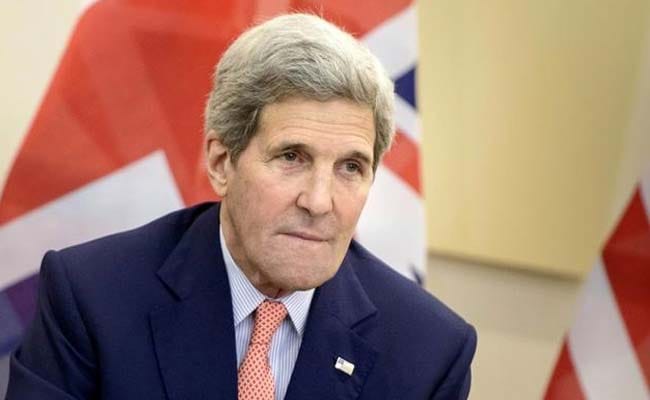
Marathon talks aimed at curtailing Iran's nuclear programme stretched into the night Monday as negotiators grappled with the remaining "tricky issues" blocking a deal with a deadline just hours away.
"There still remain some difficult issues," Kerry told a CNN reporter in his luxury lakeside hotel in the Swiss town of Lausanne.
"We are working very hard to work those through. We are working late into the night and obviously into tomorrow."
Global powers are racing against the clock to nail down the final pieces of a framework deal aimed at stopping Iran from obtaining a nuclear bomb by Tuesday's midnight deadline.
Adding to the drama, Russian Foreign Minister Sergei Lavrov left the crunch talks with Iran in Switzerland after a series of meetings, Russian media reported.
He will only return if there is a "realistic" chance of a deal, his spokeswoman said earlier.
Kerry said there was "a little more light ... today, but there are still some tricky issues. Everyone knows the meaning of tomorrow. "
State Department acting spokeswoman Marie Harf appealed to the Iranians to help overcome the last hurdles. "It's sort of time to see whether they can make these decisions."
German Foreign Minister Frank-Walter Steinmeier said major points of contention were Iran's "very ambitious" demands once a first "phase" of a deal lasting around 10 years expires.
"We must take precautions to ensure that what happens after the 10 years expire really is verifiable and transparent," he told German broadcasters. "We cannot allow there to be a really explosive development after 10 years."
Bones of contention
Lavrov and his counterparts from the United States, China, Britain, France and Germany are trying to pin down the outlines of a deal which will then be fleshed out with technical annexes by June 30.
They want Iran to scale back its nuclear programme to give the world ample notice of any dash to make the bomb and end a crisis that has threatened to escalate dangerously for 12 years.
A Western diplomat said it was "yes or no" time, adding the talks remained blocked on three major issues -- the length of the accord, the lifting of UN sanctions and a mechanism to ensure both sides stick to the deal.
The diplomatically isolated Islamic republic denies wanting atomic weapons and is calling for the lifting of sanctions that have strangled its lifeblood oil exports and its access to the global financial system.
Global powers only want a gradual easing of the sanctions to ensure they can be snapped back into place if Iran reneges on the deal.
The threat of new US sanctions, and domestic pressure on Iranian President Hassan Rouhani for his attempts at rapprochement with the West, all but rule out any further extension of the deadline.
"We had a very important meeting, and detailed discussions," Iran's lead negotiator Abbas Araghchi said, while insisting "we have solutions" for most of the remaining issues.
China's Foreign Minister Wang Yi said he was "cautiously optimistic" adding the differences between the parties were "narrowing."
With all eyes focused on Tuesday's deadline, Harf said she could not predict what would happen if the outlines of a deal were not agreed in time.
"Obviously we always are planning for contingencies," she told reporters, adding: "We will have to take a very hard look at where we are and we will have to decide what happens next."
Jigsaw
The administration of President Barack Obama is facing a looming battle with rival Republicans who have threatened to try to slap new sanctions on Iran once they return from recess on April 14.
Western diplomats say some areas in a highly complex jigsaw puzzle are tentatively agreed. One said Iran had "more or less" agreed to slash the number of its centrifuge enrichment machines from 20,000 to 6,000 and to ship abroad most of its stockpile of low-enriched uranium.
Iranian officials dismissed the numbers as "speculation", with Araghchi ruling out sending the stocks abroad, although he said "other options" were being examined, such as diluting low-enriched uranium or converting it to another form.
The powers also want Iran's remaining facilities to be subject to an unprecedented level of inspections by the UN atomic watchdog.
Its underground facility at Fordo would also likely be barred from uranium enrichment, diplomats said, although it might be kept open for research purposes.
Track Latest News Live on NDTV.com and get news updates from India and around the world

